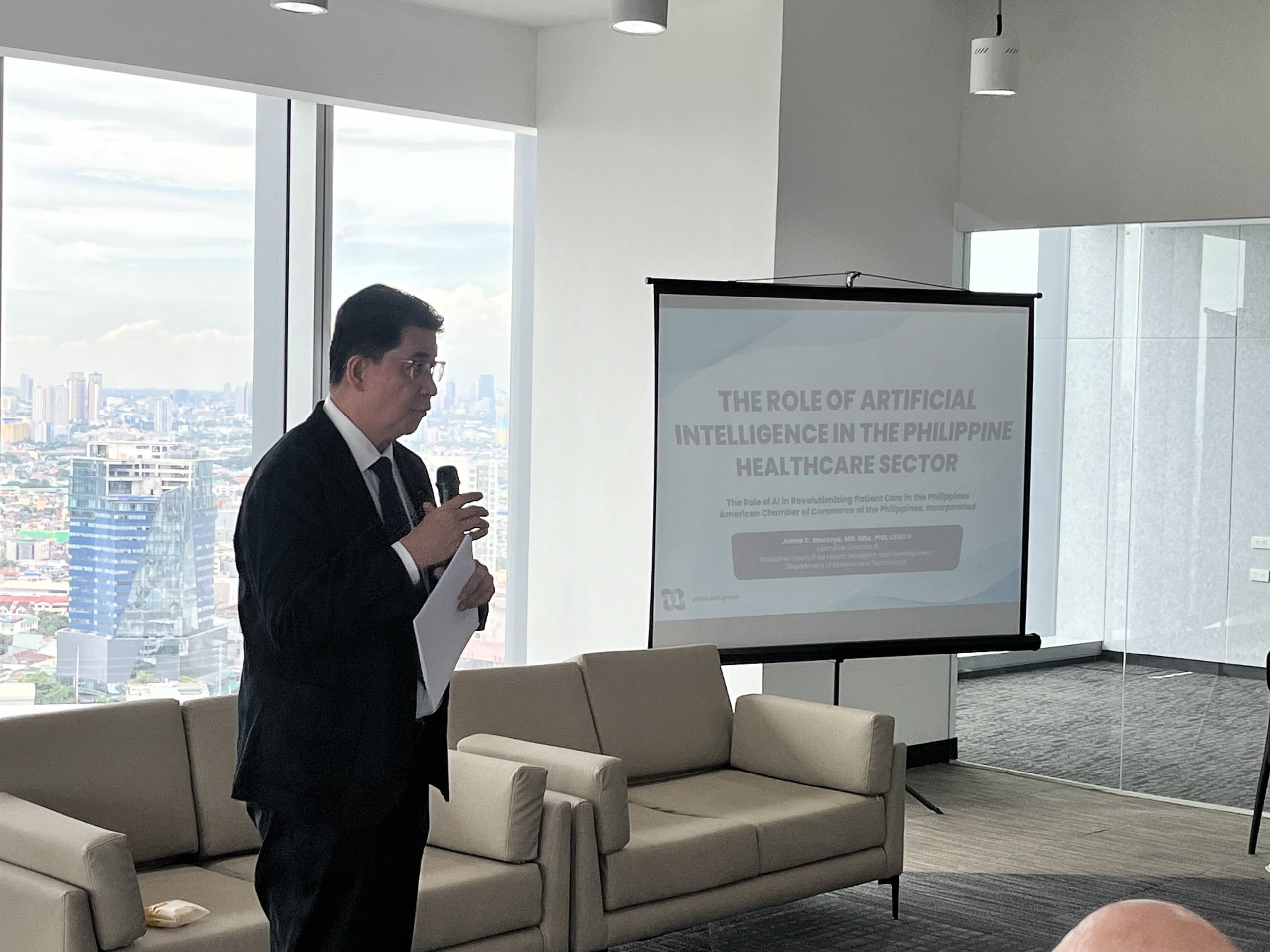NEWS AND UPDATES
DOST-PCHRD presents AI-driven innovations at AmCham Philippines

“Our funding and support for Artificial Intelligence (AI)-driven projects testifies our commitment to utilizing AI to enhance healthcare and advance medical research,” said the Department of Science and Technology – Philippine Council for Health Research and Development (DOST-PCHRD) Executive Director, Dr. Jaime C. Montoya.
In his presentation entitled, “The Role of AI in the Philippine Healthcare Sector” at the American Chamber of Commerce of the Philippines Inc. (AmCham) in Makati City on 27 August 2024, Dr. Montoya presented several AI-driven health innovations supported by the DOST-PCHRD. He shared completed and newly implemented projects, emphasizing their potential to transform healthcare delivery and address the needs of underserved populations nationwide.
Among the AI-driven projects presented, the Artificial Intelligence Nutrition Assistant (AINA) stands out for its innovative approach to dietary management. Developed by the DOST – Food and Nutrition Research Institute (FNRI) under the leadership of Ms. Marilou Madrid. This ongoing project aims to develop an automated food recognition and dietary assessment mobile application that can be used by nutrition and public health professionals, researchers, food production professionals, and other stakeholders to monitor their client’s diet intake and quality.
In the fields of neuro-oncology and neuroradiology, the UTAK AI project uses AI-assisted imaging techniques to detect and analyze brain tumors, achieving high accuracy in tumor identification, which accelerates diagnosis and facilitates timely treatment through training models on thousands of brain scan images. Spearheaded by Dr. Michael Lucas Tee from the University of the Philippines Manila, in collaboration with Taipei Veterans General Hospital, Taiwan AI Labs, and Philippine General Hospital, and supported under the Manila Economic and Cultural Office-Taipei Economic Cultural Office Health, Agriculture, and Training Initiative (MECO-TECO HAT), the project’s capability in brain tumor detection and analysis will be beneficial for patients, especially in remote places with limited access to specialized medical facilities, improving survival rates and quality of life.
In public health surveillance and responsiveness, the HealthPH project detects trends in social media posts on emerging respiratory infectious diseases. Led by Dr. Mideth B. Abisado of the National University – Manila, HealthPH’s real-time surveillance enables health authorities to make informed decisions and provides accurate data to craft policies for better public health services. For instance, early detection of a potential epidemic allows for targeted interventions that can alleviate the spread of respiratory diseases, preventing the surge or emergence of an outbreak and improving public health response strategies, which can result in fewer social and economic disruptions.
Lastly, regarding the impact on operational efficiency in healthcare resources, MedHyve, a DOST-PCHRD funded project under the Startup Research Grant program led by Mr. Gabriel Henry Lopez, uses an intuitive web-based AI-powered platform that transforms the procurement process within the medical supply chain by connecting healthcare providers directly with suppliers. MedHyve also helps predict demand, optimize inventory, and automate order placements, reducing delays and ensuring timely access to necessary supplies.
In closing, Dr. Montoya said, “Integrating AI into our healthcare system not only elevates the quality of care but also makes healthcare more accessible to all Filipinos, particularly those in underserved areas. These AI-driven projects reflect our ongoing efforts to modernize and advance our country’s healthcare services.”
Dr. Montoya’s presentation at AmCham introduced new opportunities for the Council to share its health R&D initiatives. His interaction with business leaders and stakeholders from Filipino and American enterprises opens doors for resource sharing and the advancement of AI-driven healthcare solutions that can benefit both countries.
Written by: Ranz Elifred Valdez




